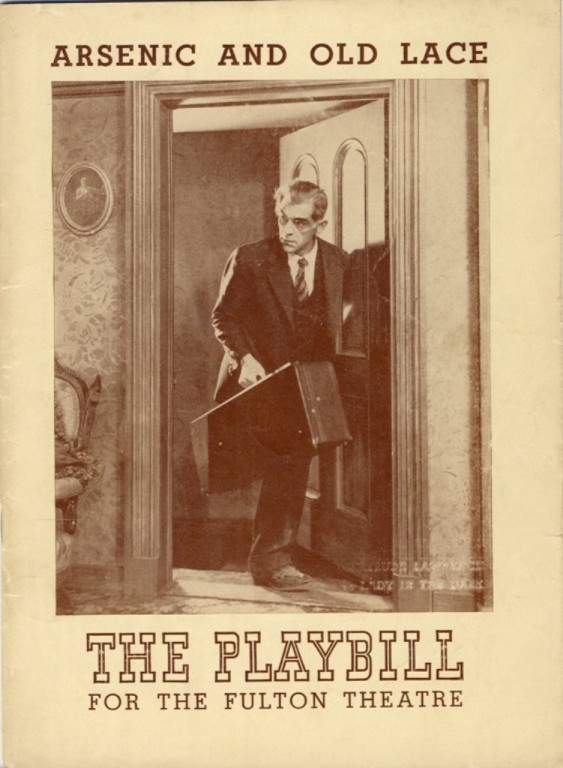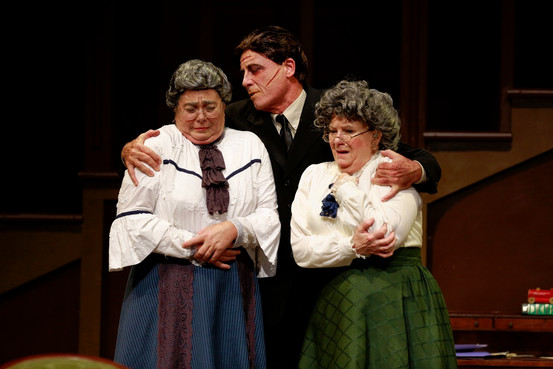“The proverb of De mortuis is founded on humbug. Humbug out of doors is necessary. It would not do for you and me to go into the High Street just now and say what we think about Mrs. Proudie; but I don’t suppose that kind of thing need be kept up in here, between you and me.”
Anthony Trollope, The Last Chronicle of Barset
Archives for January 2014
TT: Lookback
From 2004:
Since we’re on the subject of me, my brother and his daughter were looking at Smalltown High School yearbooks at the dinner table last night, some of which were published back when I edited the high-school newspaper. That was–gulp–30 years ago. As my niece made fun of the hair styles of 1974, I found myself recalling some of the ways in which I first became aware of the larger world of art and culture, and it occurred to me that in lieu of a more formal chronicle, it might be interesting to draw up a list of cultural firsts….
Read the whole thing here.
TT: A dextrous revival
In today’s Wall Street Journal I review a revival of Arsenic and Old Lace in Fort Myers, Florida. Here’s an excerpt.
* * *
 It surely tells something instructive about America in the ’40s that two of the best-loved stage plays of that turbulent and anxious decade were farces whose central characters are–not to put too fine a point on it–somewhat wrong in the head. Elwood P. Dowd, the genial hero of Mary Chase’s “Harvey,” is a booze-loving ne’er-do-well whose best friend is a six-foot-tall white rabbit that only he can see. As for Joseph Kesselring’s “Arsenic and Old Lace,” it revolves around the skullduggeries of three multiple murderers, one of whom is an escapee from a prison for the criminally insane who looks just like Boris Karloff (and was played in the original Broadway production by Karloff himself). The other two are a pair of sweetly fluttery maiden aunts whose charitable causes include what they think of as mercy killing: They’ve poisoned a dozen lonely old men and stashed the corpses in the basement of their cozy Brooklyn home. That’s a decidedly odd-sounding premise, yet “Arsenic and Old Lace” ran for three and a half years on Broadway, after which Frank Capra turned it into a hit movie, so it must have had something compelling to say to a nation at war.
It surely tells something instructive about America in the ’40s that two of the best-loved stage plays of that turbulent and anxious decade were farces whose central characters are–not to put too fine a point on it–somewhat wrong in the head. Elwood P. Dowd, the genial hero of Mary Chase’s “Harvey,” is a booze-loving ne’er-do-well whose best friend is a six-foot-tall white rabbit that only he can see. As for Joseph Kesselring’s “Arsenic and Old Lace,” it revolves around the skullduggeries of three multiple murderers, one of whom is an escapee from a prison for the criminally insane who looks just like Boris Karloff (and was played in the original Broadway production by Karloff himself). The other two are a pair of sweetly fluttery maiden aunts whose charitable causes include what they think of as mercy killing: They’ve poisoned a dozen lonely old men and stashed the corpses in the basement of their cozy Brooklyn home. That’s a decidedly odd-sounding premise, yet “Arsenic and Old Lace” ran for three and a half years on Broadway, after which Frank Capra turned it into a hit movie, so it must have had something compelling to say to a nation at war.
 Though “Arsenic and Old Lace” hasn’t been seen on Broadway since 1987, it continues to be mounted by high-school troupes and community theaters. Major-house regional stagings appear to be growing increasingly scarce, however–the last one I saw was at Baltimore’s CenterStage in 2007–so I decided to check out Florida Repertory Theatre’s revival, directed by Dennis Lee Delaney, both because of the sterling track record of that excellent company and because I was curious to find out how “Arsenic and Old Lace” would go over in the bloodsoaked age of “Dexter.” The answer is that it’s still very, very funny, and that Mr. Delaney and his well-matched cast succeed in making every laugh count….
Though “Arsenic and Old Lace” hasn’t been seen on Broadway since 1987, it continues to be mounted by high-school troupes and community theaters. Major-house regional stagings appear to be growing increasingly scarce, however–the last one I saw was at Baltimore’s CenterStage in 2007–so I decided to check out Florida Repertory Theatre’s revival, directed by Dennis Lee Delaney, both because of the sterling track record of that excellent company and because I was curious to find out how “Arsenic and Old Lace” would go over in the bloodsoaked age of “Dexter.” The answer is that it’s still very, very funny, and that Mr. Delaney and his well-matched cast succeed in making every laugh count….
* * *
Read the whole thing here.
Boris Karloff stars in a 1952 radio adaptation of Arsenic and Old Lace:
TT: Almanac
“It seems an impertinence, when pushing eighty-two, to deliberately associate with people a lot younger than oneself, feeling that possibly one might interest or entertain them. Of course it isn’t quite that: secretly one hopes and longs to draw on the vitality and brightness of the young, and above all to be able to join in their laughter.”
Alec Guinness, My Name Escapes Me: The Diary of a Retiring Actor
TT: So you want to see a show?
Here’s my list of recommended Broadway, off-Broadway, and out-of-town shows, updated weekly. In all cases, I gave these shows favorable reviews (if sometimes qualifiedly so) in The Wall Street Journal when they opened. For more information, click on the title.
BROADWAY:
• A Gentleman’s Guide to Love & Murder (musical, PG-13, most performances sold out last week, reviewed here)
• Matilda (musical, G, all performances sold out last week, reviewed here)
• No Man’s Land/Waiting for Godot (drama, PG-13, playing in rotating repertory, extended through Mar. 30, nearly all performances sold out last week, reviewed here)
• Once (musical, G/PG-13, nearly all performances sold out last week, reviewed here)
• Twelfth Night (Shakespeare, G/PG-13, closes Feb. 16, all performances sold out last week, reviewed here)
OFF BROADWAY:
• Avenue Q (musical, R, adult subject matter and one show-stopping scene of puppet-on-puppet sex, reviewed here)
• The Commons of Pensacola (drama, PG-13, newly extended through Feb. 9, reviewed here)
• The Fantasticks (musical, G, suitable for children capable of enjoying a love story, reviewed here)
• Hamlet/Saint Joan (drama, G/PG-13, remounting of off-Broadway production, performed in rotating repertory, newly extended through Mar. 9, original production reviewed here)
• The Night Alive (drama, PG-13, closes Feb. 2, reviewed here)
IN GLENCOE, ILL.:
• Port Authority (drama, PG-13, newly extended through Mar. 2, reviewed here)
CLOSING SOON OFF BROADWAY:
• Juno and the Paycock (drama, G/PG-13, far too dark for children, closes Jan. 26, reviewed here)
CLOSING NEXT WEEK IN CHICAGO, ILL.:
• The Merry Wives of Windsor (Shakespeare, PG-13, closes Jan. 19, reviewed here)
CLOSING SUNDAY IN CHICAGO, ILL.:
• An Inspector Calls (drama, PG-13, reviewed here)
CLOSING SUNDAY OFF BROADWAY:
• Fun Home (musical, PG-13, reviewed here)
CLOSING SUNDAY ON BROADWAY:
• Macbeth (Shakespeare, PG-13, reviewed here)
TT: Almanac
“There is a foolhardiness in the old which makes the tactlessness of the young look very circumspect.”
Alec Guinness, A Positively Final Appearance
TT: Read all about it
Jazz pianist Ethan Iverson, whose work with the Bad Plus and on his own will be well known to longtime visitors to this space, recently interviewed me for his widely read and deservedly influential blog, Do the Math. We talked at length and in considerable detail about Duke: A Life of Duke Ellington, as well as a variety of other subjects ranging from my recent efforts as a playwright and opera librettist to our shared admiration for Anthony Powell, Rex Stout, and Donald Westlake:
I think it’s very foolish to compare Westlake to Proust, as I’ve actually seen done in print. In the first place, it’s stupid–and in the second place, you don’t need to. Donald Westlake’s place in the history of literature is quite adequately secured by virtue of his having been Donald Westlake. He doesn’t have to be anything else.
This is true of jazz as well. An important secondary theme in my Ellington book is when classical musicians first discovered jazz and started writing about it. It matters. I don’t deprecate the significance of the fact that Constant Lambert, Percy Grainger and Aaron Copland understood what Ellington was early in his career. But some people think that in order to take Duke Ellington seriously as a composer, we have to believe that he was successful as a composer of large-scale works. The idea, I guess, is to push him up into the classical-music arena: he played in Carnegie Hall, therefore he’s serious. And that’s completely wrong. Duke Ellington is serious because he is Duke Ellington. He’s serious because of the work itself….
In addition to posting a carefully edited transcript of the interview, Ethan has also written an accompanying essay about Ellington called “Reverential Gesture” in which he discusses in a thoroughly civil manner his differences with some of the musical analysis in Duke, engaging with what I actually wrote in the book rather than caricaturing it. Unlike some of my less temperate critics, he read Duke closely–and took it seriously. I expected no less.
You can read both the interview and the essay by going here.
TT: Snapshot
Arturo Benedetti Michelangeli plays Beethoven’s Piano Sonata No. 32 in C Minor, Op. 111:
(This is the latest in a series of arts-related videos that appear in this space each Monday and Wednesday.)
